| xx |
| xx |
| SE |
| cc |
| www.fretnotgospel.com/northernireland.html |
| cc |
References - Books Northern Ireland in Pictures (Visual Geography Series), Lerner Publishing Group, Lerner Geographic Editors, 1991, p.64 Internet The Accord http://cain.ulst.ac.uk/events/peace/docs/agreement.htm Peace www.infoplease.com/ipa/A0781490.html |
| by Noah Arthur |
| by Noah Arthur |
| by Noah Arthur |
| by Noah Arthur |
| by Noah Arthur |
| by Noah Arthur |
| 2ND IMPORTANT THING ABOUT NO. IRELAND Eventhough the language is the same Northern Irish life in many ways is not like American life. Overall Catholics are much poored than Protestants. Rural Catholics often live in cottages with shingled or thatched rooves. Urban Catholics and Protestants often live in row housing. In row housing, toilets are often in the backyard. Many people enjoy going to public houses, normally called pubs. People go there to talk, drink, and sometime eat. Northern Ireland puts more money into each school student than any other United Kingdom country, so it has better education. While Catholic kids usually go to church-run schools, Protestant kids usually attend government-run schools. For kids 5-16 years old, attending school is required. After secondary school, students can choose to attend colleges or universities or stop going to school. Norther Ireland has Celtic musical and artistic traditions. The harp, fiddle, and drums are traditional instruments. Music is almost always played in pubs, at church services, and at parades. Seamus Heany and L. MacDonald were Northern Irish poets. Poetry and storytelling is often done by people called rhymers who perform for schoolchildren. C.D. Lewis was a translator and author in the 18th-century. The National Health Service is active in Northern Ireland, providing free tax-funded health care. Dental care is not free. Health is better overall in Northern Ireland than in the rest of Europe, and so is the infant mortality rate. Northern Irish life expectancy is 73 years. Northern Ireland's social welfare program helps the sick, disabled, unemployed, and many other troubled people. Periods of high unemployment put financial stress on social welfare programs. |
| Northern Ireland |
 |
 |
| The 1998 Good Friday Accord Declaration of Support 1. We the participants in the multiparty negotiations believe the agreement we have negotiated offers a truly historic opportunity for a new beginning. 2. The tragedies of the past have left a deep and profoundly regrettable legacy of suffering. We must never forget those who have died or been injured, and their families. But we can best honour them through a fresh start, in which we firmly dedicate ourselves to the achievement of reconciliation, tolerance, and mutual trust, and to the protection and vindication of the human rights of all. 3. We are committed to partnership, equality and mutual respect as the basis of relationships within Northern Ireland, between North and South, and between these islands. 4. We reaffirm our total and absolute commit-ment to exclusively democratic and peaceful means of resolving differences on political issues, and our opposition to any use of threat of force by others for any political purpose, whether in regard to this agreement or otherwise. 5. We acknowledge the substantial differences between our continuing, and equally legitimate political aspirations. However, we will endeavor to strive in every practical way towards reconciliation and rapproachment within the framework of democratic and agreed arrangements. We pledge that we will, in good faith, work to ensure the success of each and everyone of the arrangements to be established under this agreement. It is accepted that all of the institutional and constitutional arrangements - an Assembly in Northern Ireland, a North/South Ministerial Council, implementation bodies, a British-Irish Council, and a British-Irish Intergovernmental Conference and any amendments to British Acts of Parliament and the Constitution of Ireland - are interlocking and interdependent and that in particular the functioning of the Assembly and the North/ South Council are so closely interrelated that the success of each depends on that of the other. 6. Accordingly, in a spirit of concord, we strongly commend this agreement to the people, North and South, for their approval. Constitutional Issues 1. The participants endorse the commitment made by the British and Irish Governments that, in a new British-Irish Agreement replacing the Anglo-Irish Agreement, they will: (i) recognise the legitimacy of whatever choice is freely exercised by a majority of the people of Northern Ireland with regard to its status, whether they prefer to continue to support the Union with Great Britain or a sovereign united Ireland; (ii) recognise that it is for the people of the island of Ireland alone, by agreement between the two parts respectively and without external impediment, to exercise their right of self-determination on the basis of consent, freely and concurrently given, North and South, to bring about a united Ireland, if that is their wish, accepting that this right must be achieved and exercised with and subject to the agreement and consent of a majority of the people of Northern Ireland; (iii) acknowledge that while a substantial section of the people in Northern Ireland share the legitimate wish of the majority of the people of the island of Ireland for a united Ireland, the present wish of a majority of the poeple of Northern Ireland, freely exercised and legitimate, is to maintain the Union and, accordingly, that Northern Ireland's status as part of the United Kingdom reflects and relies upon that wish; and that it would be wrong to make any change in the status of Northern Ireland save with the consent of a majority of its people; (iv) affirm that if, in the future, the people of the island of Ireland exercise their right of self-determination on the basis set out in sections (i) and (ii) above to bring about a united Ireland, it will be a binding obligation on both Governments to introduce and support in their respective Parliaments legislation to give effect to that wish; (v) affirm that whatever choice is freely exercised by a majority of the people of Northern Ireland, the power of the sovereign government with jurisdiction there shall be exercised with rigorous impartiality on behalf of all the people in the diversity of their identies and traditions and shall be founded on the principles of full respect for, and equality of, civil, political, social and cultural rights, of freedom from discrimination for all citizens, and of parity of esteem and of just and equal treatment for the identity, ethos, and aspiration of both communities; (vi) recognise the birthright of all the people of Northern Ireland to identify themselves and be accepted as Irish or British, or both, as they may so choose, and accordingly confirm that their right to hold both British and Irish citizenship is accepted by both Governments and would not be affected by any future change in the status of Northern Ireland. 2. The participants also note that the two Governments have accordingly undertaken in the context of this comprehensive political agreement, to propose and support changes in, respectively, the Consiti-tution of Ireland and in British legislation relating to the constitutional status of Northern Ireland. |
| The Beakers and Celts From 3000 BC on, there have definitely been people in Northern Ireland. First, there were the Beaker people. They left the earthenware that got them their name. Then, the Celts came from mainland Europe. They were grouped together in clans called "tuathas". All the people in a tuatha were from a common ancestor. Each family in a tuatha did a different job. Each tuatha was lead by a chief. The Celts had priest called "druids". Sixteen year old Saint Patrick was brought from Europe by a Celtic raid. He worked as a slave for some years, then escaped to Europe. Later, he spread Christianity to the Celts. Invasions Soon, the Vikings came in long boats that could travel inland up rivers. The Vikings looted monasteries and destroyed Christian writings, trying to replace Christianity with their beliefs. Finally, all Ireland united against the Vikings under Brian Boru. At the battle, Boru's army won, but he was killed. Next, the Normans invaded England and Northern Ireland. At first, the Northern Irish kept back the Normans, but then, a Northern Irish chief, McMorrough, co-operated with the Normans so that he could get back his lost land. The Normans introduced the feudal system, where lower royal people exchanged their loyalty and part of their crops to the king in exchange for land. Norman-English kings ruled, and soon the Northern Irish fought and hired Scottish warriors. Finally, they defeated the Normans. English Oppression In the early 1500s, there was an English ruled area around Dublin. It was called the Pale. The English king, Henry VII, made anti-Irish laws, like not being allowed to speak out openly against the government. At this time, Henry VIII began ruling England. He forced Protestantism on Northern Ireland. That was when Catholic/ Protestant fighting began. Soon Henry VIII was looting Catholic churches and monasteries. Henry VIII successor, Edward VI, made Protestantism Northern Ireland's official religion. He took the land from Northern Irish nobles who did not accept the new form of Christianity. Hugh O'Neill started a Northern Irish uprising against the English, who were oppressing the Northern Irish more and more. O'Neill's forces won. England got together a big army to fight Northern Ireland. in 1588, Northern Ireland called up the Spanish Armada to help them. But almost all of the Armada sunk in bad weather and England won. The English took away all Northern Irish political and religious rights. Northern Ireland fought fiercely to keep its land. When James I of Scotland became King of England, more English newcomers arrived in Northern Ireland. The Northern Irish were oppressed more and more. They weren't allowed to have their own culture or to gather together. The 20% of the Northern Irish residence that were English owned 80% of the land. Fierce rebellions and uprisings began again. Many Northern Irish forces were successful. They drove out some English from their walled cities. English Kings Charles II and James I were better to the Catholic Northern Irish, than a high political English person before them, Oliver Cromwell. The tension wasn't only between English and Irish, but also between Protestant and Catholic within Northern Ireland. Northern Irish people held only 10% of the land in the early 1700s. While the British army was off in North America, Irish Protestants took the opportunity to gain more independence. It turned out well for both Northern and Southern Ireland. Theobald Wolfe Tone started the United Irishmen. They staged an uprising that was quickly put down by the English. Catholics and Protestants While Catholics wanted Northern Ireland to not be English, the Protestants wanted it to be more English. Soon, Northern Ireland was made part of Great Britain. Northern Ireland then became industrialized. While Protestants got great housing and jobs, Catholics that moved to the cities got very poor housing and no work. People called Nationalists wanted all Ireland to be one nation, while the Unionist wanted Northern Ireland to have even closer ties with Great Britain. In 1845, a famine from a potato fungus hit Ireland. Northern Ireland wasn't affected as badly because it had money to buy food from Great Britain. Movements to support Catholics kept coming up and going down. Great Britain made most of these movements, but surprisingly, Northern Irish Protestant politicians turned them down. They were afraid of losing money by becoming more independent. Irish Nationalism A nationalist political party Sinn Fein (we ourselves) won a victory over the Unionist government. Soon the group was at war with Northern Ireland's Unionists. Sinn Fein members got places in the British parliament. The Sinn Fein parliament members formed their own government. But the English stopped the government. There were some political murders. In 1920, the English soon made southern Ireland a free state and the northern part, formerly called Ulster, part of Great Britain. They now called it Northern Ireland. An agreement between the south, north, and Great Britain well defined the borders. Most Catholics didn't agree and fought against the agreement. Soon the Special Powers Act oppressed the Northern Irish. It allowed the government to imprison without a charge, search a house without a warrant, and stop the making of local newspapers. It also stopped the Irish Republican Army (IRA) from invading Northern Ireland from the south, and stopped Catholics from holding anti-Unionist parades. There were Catholic riots after a Protestant organization called the Orange Order held an annual parade. World War II Northern Ireland helped Great Britain when World War II started in 1939, and Ireland did not. Because Northern Ireland helped against Germany, Belfast was bombed. The IRA then attacked Northern Ireland again, but this got them little support. Terrence O'Neill became Prime Minister of Northern Ireland. Although he was a Unionist, O'Neill wanted to make Unionist/Protestants and Nationalist/Catholics closer together. A man named Ian Paisley and a force called the Ulster Volunteer Force (UVF) worked against O'Neill and made his job very hard. O'Neill didn't succeed. The Northern Ireland Civil Rights Association (NICRA) was founded in Belfast to try to make equality between Catholics and Protestants. Even in Catholic neighborhoods, Protestants got the best houses and best work. The main area of Protestant and Catholic fighting was in the neighborhood of Bogside. Barricades were built to keep Protestant/ Unionist out of the Catholic neighborhood. Still rocks and small gasoline bombs were thrown over the barricades both ways. Bernadette Devlin was a Northern Irish civil rights supporter. She was elected to the British Parliament. She made speeches in both Ireland and Great Britain. Her speeches made some people more supportive of civil rights. IRA Terrorism The IRA started terroroist attacks. An Orange Order march turned into a rock throwing battle and 7 people were killed. Because the IRA attacked the British army, the Catholics supported the IRA. Terrorist activity grew, and the British banned all political parades. However, they let one happen. Of course, it turned into a rock and gun battle. Thirteen people were killed. Three-hundred terrorist attacks by the IRA happened soon after, including bombings in London. The Protestant/Unionists even began doing their own terrorist activities. Great Britain stopped Northern Ireland's government, and Catholic/Protestant fighting began again. Then Britain made an Act to help Northern Ireland. It allowed the Northern Irish to speak on the phone with the Republic of Ireland. The fighting died down. In Northern Ireland there is still a large division between Protestants and Catholics. Most Protestants have high-quality jobs and housing, while many Catholics have much lower quality jobs and housing. |
| 1ST IMPORTANT THING ABOUT NO. IRELAND There is now peace. After a long time of arguing and disagreement, the Good Friday Accord was settled. It made peace between Protestant/Unionist and Catholic/ Nationalist in Northern Ireland. It was settled in 1998 because of possible violence, some Northern Irish political parties were kept out of the negotiations. The agreement made Protestant/Unionist stop oppressing Catholic/Nationalists. It also made Cathloics drop the hope of uniting Ireland into one country. We know there won't be more fighting because votes in all of Northern Ireland and the Republic of Ireland approved of the agreement by large margins. It is amazing that after all of those years of fighting, there is finally peace in Northern Ireland. To solve the problems between the Unionist/Protestants and Nationalist/ Catholics, they had to solve the problems between all of the Republic of Ireland and Great Britain. They replaced the old Anglo-Irish Agreement from the 1920's with the new British Irish Agreement. It solved the problems of the relations between the Republic of Ireland and Great Britian. The agreement changes everything between Northern Ireland, the Republic of Ireland and Great Britain. It has set up various councils and arrangements between the governments of the Republic of Ireland and Great Britain. They had to change the Irish Constitution and British Acts of Parliament to make this agreement. Anyone in conflict with someone else could learn from the Good Friday Accords, that a promised agreement will stop conflict. Also you could learn from this that to solve one conflict you might have to look into bigger unexpected problems and solve them to solve the one. The Good Friday Accords put a happy ending to a sad history of fighting. |
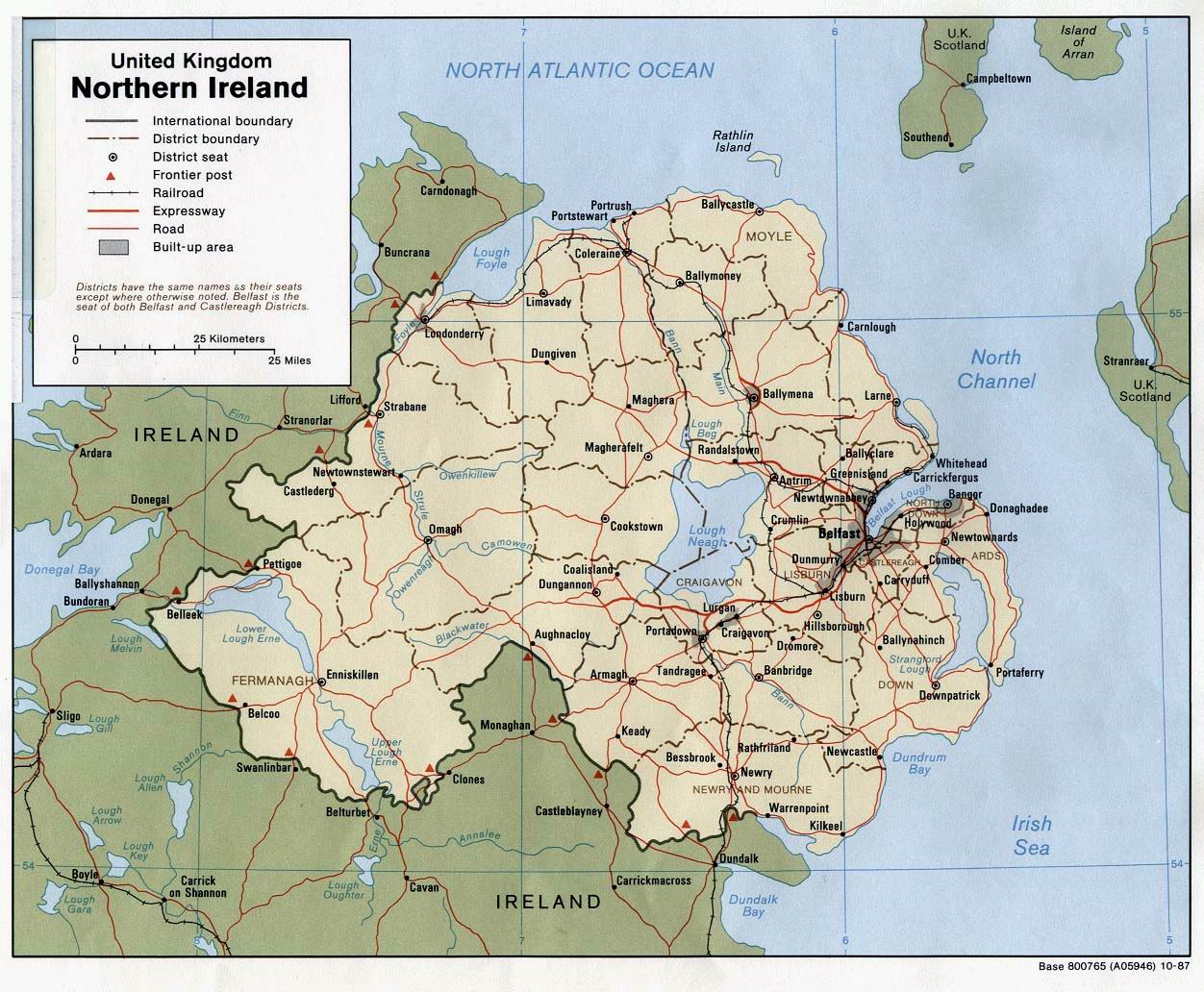 |
| by Noah Arthur |
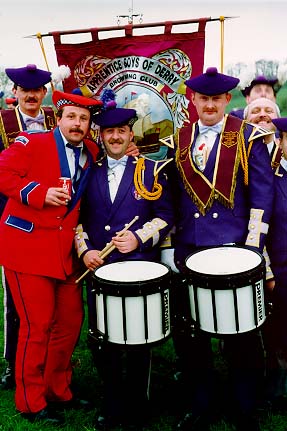 |
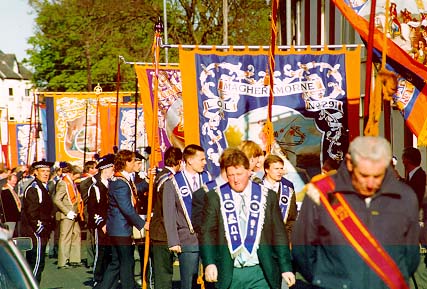 |
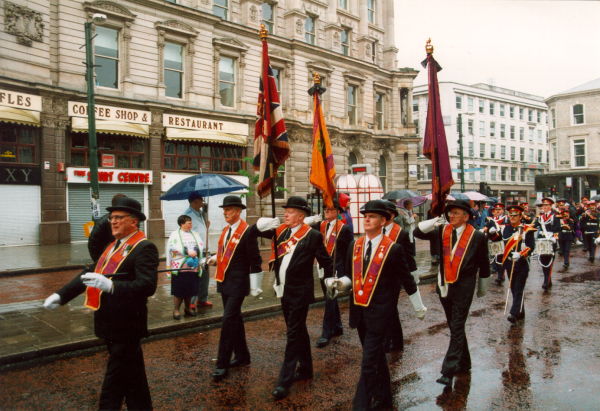 |
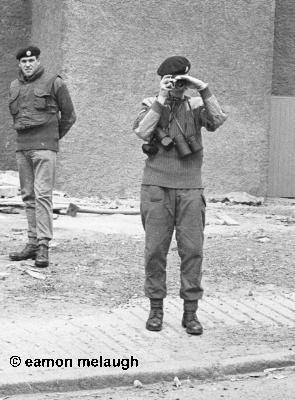 |
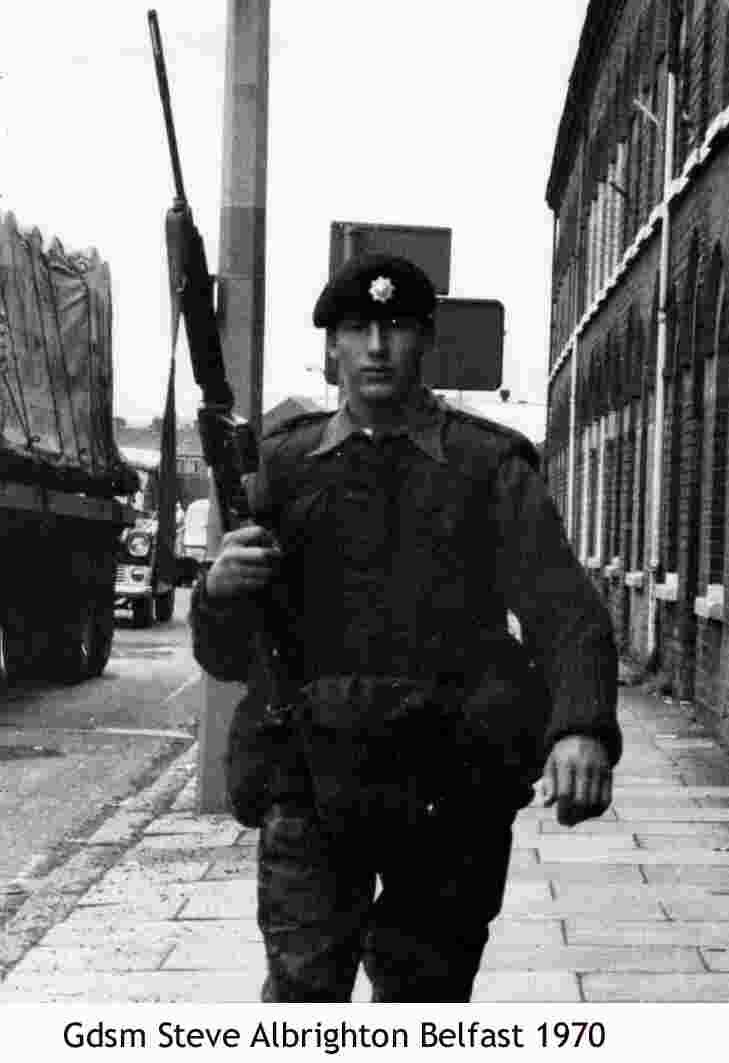 |
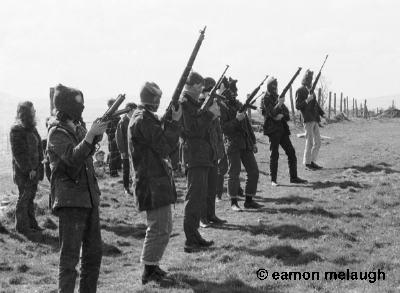 |
| Country of the Month |
| by Noah Arthur |
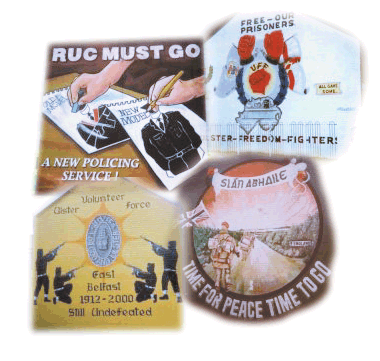 |
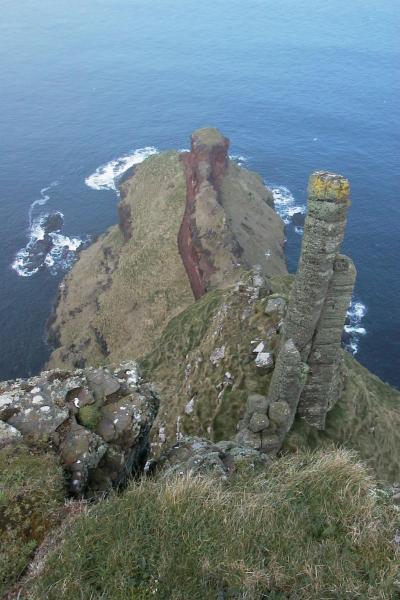 |
| by Noah Arthur |
| orange order parade |
| irish republican army |
| british soldiers |
| man with gun |
| unionist band |
| parade |
| map |
| political posters |
| seacliff |
| The Life The Northern Irish have a bit of mixed up meal schedule. Breakfast is lunch-sized. Lunch is very big and dinner is tiny, usually toast and eggs (still 1000 calories). I've heard that this is the healthiest meal schedule. Coffee breaks are taken at mid-morning and mid-afternoon. Northern Ireland has a very large variety of breads. Northern Irish sports include rugby, similar to football, cricket which is a ball and bat sport, and most popular of all, soccer, also golf, pool, chess, and darts. Fishing and walking are often done. Horse and dog racing are frequently betted on. Brightly colored textiles are traditional Northern Irish cloths. North Ireland became industrialized before the Republic of Ireland did. Immigrants from Britain kept close ties with their home country and made it so that there is more trade with Great Britain than with the Republic of Ireland. When the traditional industries of shipbuilding and linen making declined, there was high unemployment. The government gave tax bonus to business in Northern Ireland trying to get more business to come. |